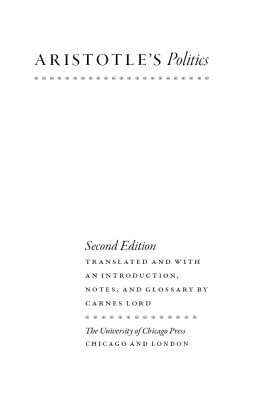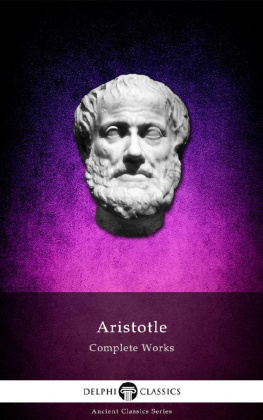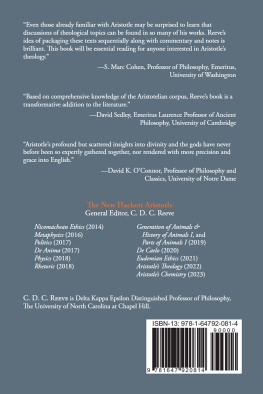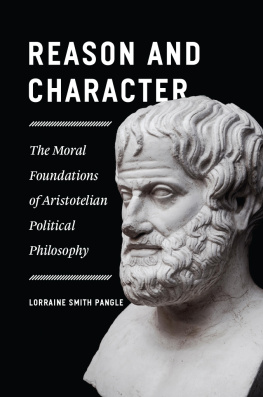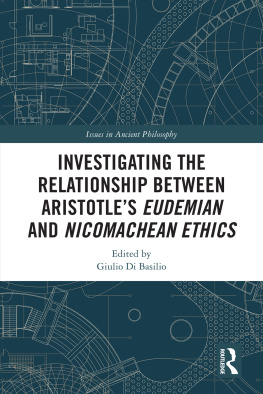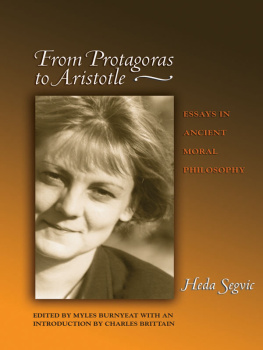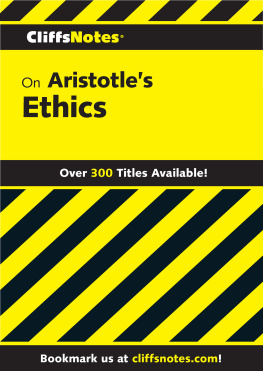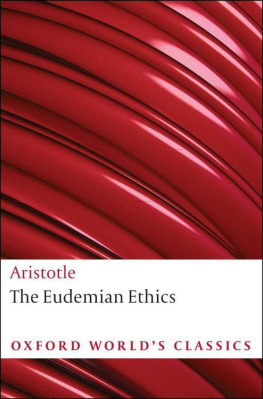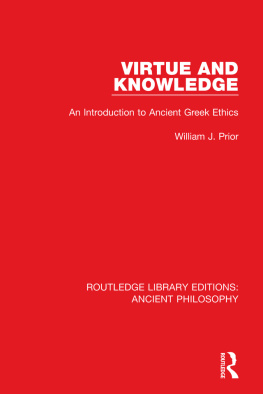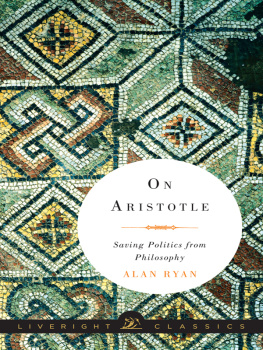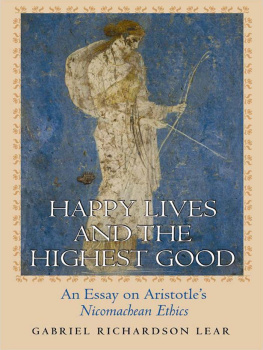
ARISTOTLES ETHICS
ARISTOTLES
ETHICS
WRITINGS FROM THE COMPLETE WORKS
Revised, edited, and with an introduction by
JONATHAN BARNES
and
ANTHONY KENNY
PRINCETON UNIVERSITY PRESS
_________________
Princeton and Oxford
Copyright 2014 by The Jowett Copyright Trustees
Requests for permission to reproduce material from this work should be sent to Permissions, Princeton University Press.
Published by Princeton University Press, 41 William Street, Princeton, New Jersey 08540
In the United Kingdom: Princeton University Press, 6 Oxford Street, Woodstock, Oxfordshire OX20 1TW
press.princeton.edu
Jacket design by Jason Alejandro
All Rights Reserved
Library of Congress Cataloging-in-Publication Data
Aristotle.
[Works. Selections. English. 2014]
Aristotles ethics : the complete writings / edited by
Jonathan Barnes and Anthony Kenny.
pages cm
Includes indexes.
ISBN 978-0-691-15846-4 (pbk. : alk. paper) 1. EthicsEarly works to 1800. I. Barnes, Jonathan, 1942editor of compilation. II. Kenny, Anthony, 1931editor of compilation. III. Title.
B407.B37 2014
171.3dc23 2013030226
British Library Cataloging-in-Publication Data is available
This book has been composed in MVB Verdigris
Pro, Lydian MT, and Syntax LT Std.
Printed on acid-free paper.
Printed in the United States of America
1 3 5 7 9 10 8 6 4 2
CONTENTS
ARISTOTLES ETHICS
INTRODUCTION
ARISTOTLE WAS BORN IN 384 IN THE SMALL TOWNSHIP OF Stagira, in north-eastern Greece. His father, Nicomachus, was a physician attached to the Macedonian court. At the age of seventeen he moved south to Athens, and joined the Academy, that brilliant band of philosophers, scientists, mathematicians, and politicians which gathered in Athens under Platos leadership. For twenty years he remained as Platos pupil and colleague, and made a name for himself as an industrious student, a vigorous polemicist, and an independent thinker, with an early interest in rhetoric, logic, metaphysics, and ethics.
In 359 King Philip II succeeded to the throne of Macedon. He adopted an expansionist policy, waged war on a number of Greek city-states, and made himself master of Greece. It cannot have been an easy time for a Macedonian in Athens, though Aristotle remained on the warmest terms with Plato, whom on his death in 347 he described as the best and happiest of mortals whom it is not right for evil men even to praise.
Once Plato was dead, however, Aristotle found it prudent to emigrate. He settled in the eastern Aegean, first at Atarneus, then at Assos. Hermias, the ruler of Atarneus, was a graduate of the Academy, and offered an intellectual home to Aristotle and a few fellow-exiles. Aristotle later married his adopted daughter.
During his period in Assos, and during the next few years when he lived at Mytilene on the island of Lesbos, Aristotle carried out extensive scientific research, particularly in zoology and marine biology, whose results remained unrivalled for two millennia. Here Aristotle first worked with Theophrastus, who was to become his successor and greatest pupil.
In 343 Aristotle was summoned to the Macedonian capital by King Philip as tutor to his thirteen year old son, the future Alexander the Great. We know nothing of the content of his instruction, though forgers later concocted correspondence between the monarch and the philosopher. Within ten years of succeeding his father, Alexander had made himself master of an empire that stretched from the Danube to the Indus and included Libya and Egypt. While Alexander was conquering Asia, Aristotle was back in Athens, where in 335 he established his own school in the Lyceum, a gymnasium just outside the city boundary. Now fifty, he built up a substantial library, and collected around him a group of research students, called peripatetics because they walked up and down while discussing philosophy. And for a decade he explored and expounded and taught the entire field of human knowledgelogic, metaphysics, theology, history, politics, ethics, aesthetics, psychology, anatomy, biology, zoology, botany, astronomy, meteorology, and the ancient equivalents of physics and chemistry.
Aristotles anatomical and zoological studies gave a new and definitive turn to his philosophy. Though he retained a lifelong interest in metaphysics, his mature philosophy constantly interlocks with empirical science, and his thinking takes on a biological cast. Most of the works that have come down to us, with the exception of the zoological treatises, probably belong to this second Athenian sojourn. There is no certainty about their chronological order, and indeed in the form in which they have survived it is possible to detect evidence of different layers of composition, though no consensus has been reached about the identification or dating of these strata.
In 323 Alexander died in Babylon. When the news reached Athens, Aristotle, unwilling to share the fate of Socrates, left the city lest the Athenians put a second philosopher to death. He went to Chalcis, where he died a few months later. His will, which has survived, is a happy and humane document.
ARISTOTLE LEFT BEHIND A SUBSTANTIAL CORPUS OF PHILOSOPHICAL writing: although most of it has long been lost, the items which have survived fill two thousand or more modern pages, and they cover almost the whole range of Aristotles extensive intellectual interests.
In his major works Aristotles style is very different from that of Plato. The prose he wrote is commonly neither lucid nor polished, though he could write passages of moving eloquence when he chose. His treatises, as we have them, are thought to derive from the lecture courses which he gave during his long teaching careerthey are, so to speak, his lecture notes. The notes were not used once and then filed away: rather, they were taken up, year in year out, as the exigencies of lecturing dictated; and they were subject to a series of additions, corrections and refinements. They were later prepared for public circulation; and although the ancient editors doubtless indulged in some ordering and polishing, what we now have before us is essentially what Aristotle had on the lectern in front of him when he addressed his pupils. If we look for a modern parallel for the composition and editing of the treatises, we might think of a twentieth century posthumous publication: Sense and Sensibilia, by the Oxford philosopher J. L. Austin, was published after his death by a colleague who put together a text from Austins own lecture notes which had evolved over the years.
Everything Aristotle wrote is fertile with ideas and full of energy; every sentence is packed with intellectual punch. But effort is needed to decode the message of his jagged clauses: what has been delivered to us from Aristotle across the centuries is a set of telegrams rather than epistles.
HUMAN KNOWLEDGE, ACCORDING TO ARISTOTLE, DIVIDES into disciplines or sciences. These sciences group under three main heads: the contemplative, the practical, and the productive. The major divisions of contemplative science are theology, mathematics, and physics or natural science; and the majority of Aristotles surviving works, being concerned with natural science, fall therefore under the heading of contemplation. Productive sciences are, naturally enough, sciences that have a product. They include weaving and architecture, with products such as garments and houses, but also disciplines such as strategy and rhetoric, where the product is something less concrete, such as victory on the battlefield or in the law-courts. Aristotles ethical treatises are works of practical science. What that means is that the characteristic aim of studying ethics is not the acquisition of knowledge about action but action itselfwe study ethics, according to Aristotle, not in order to know what good men are like, but in order to act as good men act.
Next page


